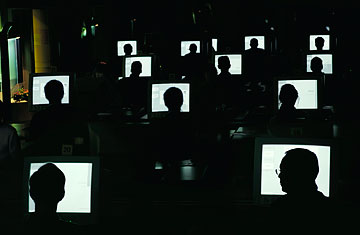
For all the talk of the Internet's threat to authoritarian regimes, China's Communist Party has capably rebuffed the Web's challenge to its rule. But a growing trend on the Chinese Internet could make life unpleasant for a handful of government bureaucrats who offend the cybercitizenry. (See pictures of China's electronic-waste village.)
For years, the Chinese Internet has pulsated with so-called human-flesh search engines, online mobs that track down, name and shame people whose behavior has sparked public outrage. In one prominent case in 2006, a Hangzhou woman who appeared in online photos and videos crushing a cat underfoot was located based on details gleaned from the images. She was vilified online and eventually lost her job. These digital tar-and-featherings have been criticized as invasions of privacy and have even sparked lawsuits. Earlier this month, Wang Fei, a Beijing man whose wife committed suicide after discovering his infidelity, won a lawsuit against a friend of his wife's. The friend had posted Wang's personal information from the wife's journal discussing his affair, setting off intense criticism that caused Wang to lose his job.
That hasn't deterred Web vigilantes from turning their attention to officials suspected of corruption or unseemly behavior. In recent months, at least three government bureaucrats have been targeted. This week an anonymous blog post accused a high-ranking Beijing official responsible for Web censorship of disparaging the country's top leaders — President Hu Jintao and Prime Minister Wen Jiabao — and boasting that he alone decided what citizens could and couldn't read online. (See pictures of China on the wild side.)
The allegations in the post, titled "What Kind of Communist Is Mr. Chen Hua?," could very well be false; there has been no official response. Calls to the Beijing Municipal Government's press office were not answered Friday afternoon.
But the post's rapid spread on the Internet shows how difficult it can be to control freelance online investigations of officials, even by the very officials tasked with controlling the Internet. The post's author claimed to be a reporter from the state-run Xinhua News Service whose daughter twice went to dinner with Chen, the deputy director in the Beijing Internet Propaganda Management office. Xiao Qiang, head of the Berkeley China Internet Project, said that within hours of the anonymous story's posting, it had migrated to thousands of other sites despite efforts by official censors to block its spread. Xiao calls this type of online opprobrium for officials "click-to-kill." "It doesn't matter if the allegation is true," says Xiao. "You know [this case] will become a 'click-to-kill' because ... many people hate this guy."
The speed with which the post spread suggested that the managers of some Chinese websites, who are required by the state to purge their chat rooms and blogs of material critical of the government, may have been slow to block an attack on an official who oversees their industry. "Mr. Chen was really arrogant," read the post, according to a translation by China Digital Times, a website run by the Berkeley China Internet Project. "When he talked about the websites under his management, it was like he was talking about his own pets. He said: 'The orders from above (about how to manage the Internet) are nothing. Hu Jintao is nothing. Wen Jiabao is worse. Only I [and his department] am really in charge of managing the Internet.' He said as far as those websites are concerned, 'I am the premier, I am the secretary-general.'"
In recent months at least two other officials have been targeted by similar posses. In November Lin Jiaxiang, an official with the Marine Affairs Bureau, allegedly followed an 11-year-old girl into the bathroom of a restaurant in the southern city of Shenzhen and grabbed her by the neck. In a video recorded by a restaurant security camera, the official acknowledged to the girl's family that he had grabbed her but said his government position meant there was nothing her family could do about it. The official resigned after a public outcry. Police investigated but declined to file charges.
A photograph of an official from the land bureau of Nanjing, the capital of Jiangsu province, came under scrutiny in December after it began circulating on the Internet. Netizens pointed out that Zhou Jiugeng's imported $25,000 watch and luxury cigarettes were of a quality far exceeding what he could afford on an official's salary. He was later dismissed.
In a country where the media fall under tight government supervision, freelance Web investigations help fill a watchdog role the press usually cannot. Web exposés are "a general phenomenon on the Internet anywhere," says Xiao. "What's new in China is that because of the lack of freedom of information, the lack of free speech for ordinary citizens, 'click-to-kill' is particularly focused on otherwise unaccountable officials. That is unique."
This week, in an apparent attempt to block further online manhunts, the city of Xuzhou in Jiangsu province banned the posting of private information about government officials. But authorities may find that those who post such information don't so easily follow orders. "This a metaphor for what the Internet is doing in China," says Xiao. "It is precisely the very [Internet] controllers themselves now being harmed."
